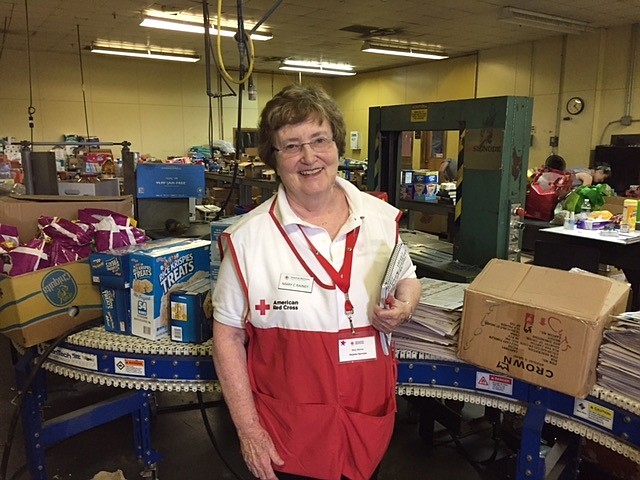- November 23, 2024
-
-
Loading

Loading

Mary Rainey is fascinated by weather — a proud weather geek.
It all stems from 2004, when she moved to Florida and was greeted with not one, not two, not three, but four hurricanes — Charley, Frances, Ivan and Jeanne.
Rainey, a native of Chicagoland who came to the Sunshine State via Akron, Ohio, said she was familiar with tornadoes, but hurricanes were a monster of a different sort. You knew it was coming, you just didn’t know when, exactly, or where it would land.
“That year, I drank wine and played Scrabble, and that’s how I got through the four storms,” she said.
In 2005, she changed her tactics. Instead of hunkering down with wine, Rainey suited up.
Education was her armor.
She started taking American Red Cross crisis response classes and armed herself with information from weather blogs on the Weather Underground website. Not only could she read real-time accounts of the storms as they moved through the gulf, she could see them via webcam.
Armed with knowledge and training, she no longer hoped the storms would miss her. Instead, she wanted to meet them head on. But her training did not prepare her for the scale of destruction she saw during her first trip.
I couldn't stand sitting on my couch when I could positively affect the situation. -Mary Rainey
Two days after Hurricane Katrina made landfall Aug. 29, 2005, on the northern Gulf Coast, Rainey was sharing a plane with the National Guard, the media and her other aid workers.
She went to Mobile, Ala., which saw the severe flooding in the wake of the storm.
There, she watched television news reports of the cascading disaster underway in New Orleans, about 140 miles to the west. More than 50 levees and flood walls protecting New Orleans and its suburbs failed after Katrina made landfall in Mississippi. Eighty percent of New Orleans and all of St. Bernard Parish flooded.
When she had a rare break, she made her way to New Orleans and saw firsthand Katrina’s indiscriminate destruction. The mountains of rubbish left in front of homes, their front doors left open to reveal bare walls, made a lasting impression.
“It really hit me in the pit of my stomach — that could happen to everybody. Whether you are poor and living next to the river or very wealthy, it just affects everybody,” Rainey said.
Severe weather and its tendency to ignore social partitions has motivated Rainey throughout her decade of Red Cross service.
Just as severe weather is indiscriminate in its destruction, Rainey said she must be equally as indiscriminate with her compassion.
At first, she said, it was Catholic guilt that motivated her to volunteer with the Red Cross. But that’s not what compelled her to volunteer during nearly every major natural disaster on U.S. soil in the past decade.
“I couldn’t stand sitting on my couch when I could positively affect the situation,” Rainey said.
She is 75 now, and while some may see her age as a hindrance, she argues it’s given her the flexibility to fly off on a moment’s notice, whether it’s going to Orlando to greet refugees after a 2010 earthquake in Haiti, or to Norman, Okla., in 2013 to lend a hand following a massive tornado.
Megarie van Sickel, executive director of the Southwest Florida Chapter of the American Red Cross, said age should never stop someone from volunteering.
“It’s really when the volunteer feels like they have committed enough time and enough service,” van Sickel said. “I don’t see (Rainey) stepping down any time soon.”